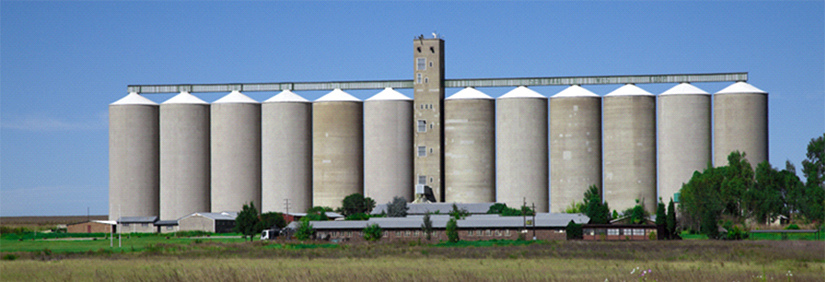OCCUPATIONAL QUALIFICATION: GRAIN DEPOT MANAGER
Small-scale storage evolved from baskets, jars and sacks to more sophisticated grain storage bins. These bins kept the crop safe from the elements and elevated from the ground. Over time, innovations have further improved grain bin efficiency, with features like perforated floors for retrofitting existing crop storage to new ones, moisture and temperature control mechanisms and varying bin depths. These innovations have also made grain storage more accessible for different types of properties, homes and businesses.
Thanks to modern technology, storing grain safely and efficiently is easier than ever. Farmers have their choice of silos, bins, elevators, bunkers or sheds. Storage capacity also increased over time with commercial business providing sufficiently for the storage of grains on behalf of the farmers. Just as it is in other industries, technology continues to revolutionize agriculture. For grain storage, this means systems with faster fill rates than before, aerator technology, flow retarders, dust suppressors and enhanced safety equipment. Smart technology has led to the development of portable grain monitoring solutions, so grain storage managers can get all the information they need about the conditions inside their storage facilities without manually inspecting them themselves. This is a process that would otherwise take up valuable work time.
Grain storage of the future will continue seeking new and more efficient ways to optimize the storage process and make the environment safer for workers. Smart technology will likely bring advancements such as more sophisticated condition management sensors, agnostic software for troubleshooting, additional robotic elements, and easier ways to harness important storage data to make better decisions for farms and businesses.
The critical role of the grain storage manager
Heading up these facilities, being responsible for millions of Rand of grains in storage, is a Grain Depot Manager. An individual with the ability to keep all the threads together, oversee the mechanical effectiveness of the facility; sustain and upgrade the quality of the grain; plan, organize and schedule the flow of grain; keep the team together and motivated and plays a progressively more important role in promoting and marketing the use of the facility amongst farmers in the area.
The demands in terms of risk management, ensuring the safety of all who enters the facilities and sustaining market share amidst growth in on-farm-storage technology and competitor onslaught are huge.
Agribusiness hence need to not only invest in the ability of Grain Depot Managers to continue to meet the ever-evolving demands associated with the job, but also need to pro-actively grow a
pipeline of job-ready assistant managers that are able to step-up and take up the management of a facility when the occasion arise.
Agbiz Grain initiate a qualification aimed to optimize the capacity of grain storage managers
Agbiz Grain, a fully-fledged and dedicated desk under the Agricultural Business Chamber (Agbiz), was established in November 2014 by the twelve largest commercial grain handling and storage companies in South Africa.
Agbiz Grain supports and promotes the interests of members through representation and liaison with major role players in agriculture such as formal grain industry bodies, government, semi-government, other role players in the grain value chain and related service providers.
Five years back Agbiz grain prioritized the development of a new QCTO accredited qualification to address the skills required by Grain Depot Managers. This programme was developed under supervision of Agbiz, with full participation of AGBIZ member companies and in cooperation with Agri Seta.
What’s the programme about?
The Grain Depot Manager Programme caters to the needs of enterprises handling grains and oilseeds, especially those serving farmers. It aims to equip grain depot managers (aspiring grain depot managers) with the skills to effectively manage grain in bulk storage.
The programme emphasises achieving operational efficiencies, responsible resource utilisation, and maintaining the mechanical integrity of bulk grain handling and storage units.
What Learners Can Expect
Upon completion, learners will be equipped to:
– Manage and achieve operational targets effectively.
– Lead and manage staff for smooth business operations.
– Utilize operational resources responsibly.
– Ensure grain handling and storage efficiency while meeting quality standards.
– Conduct precise grain and oil seed grading processes.
Known officially as the Occupational Certificate: Grain Depot Manager, (235 credits) this qualification signifies a significant step towards enhancing skills in the grain and oilseed sector. Agbiz Grain is excited about the positive impact it will have on advancing professional capabilities in the industry. This programme not only shapes future leaders but also strengthens the foundation of our agricultural community.
